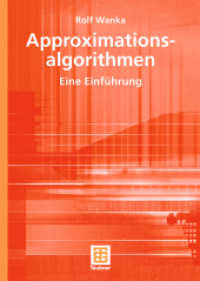- ホーム
- > 洋書
- > 英文書
- > Psychology
基本説明
Gives the reader an easily accessible venue through which to explore the deeper layers of each theory, and provides a bridge from classroom study to practice.
Full Description
This text provides a comprehensive overview of a variety of major counseling theories and focuses on the integration of different theoretical models. Appropriate for advanced undergraduates and graduate students, it offers a detailed description of the philosophical basis for each theory, along with historical context and a biography of the founder. Each chapter follows a similar format and explores the main features of the theory, including its approach to and ideas on personality development, human nature, the role of environment, the change process in therapy, and contributions and limitations to the mental health field. Theory-specific information on diagnosis, psychopharmacology, multicultural issues, spirituality, and gender issues is also discussed. These features will provide students with a deeper and more complete understanding of counseling theory than is available in any single resource and allow them to easily bridge classroom study to their future practice.This second edition of the text has been completely updated and includes more case examples, as well as a new chapter on Constructivist approaches. An online instructor's manual with student resources is available and offers material to enhance the pedagogical features of the text.
Contents
Preface. Introduction. Classical Psychoanalysis. Self Psychology. Adlerian Counseling/Individual Psychology. Existential Counseling. Person-centered Counseling. Gestalt Counseling. Behavioral Counseling. Cognitive Counseling. Rational Emotive Behavioral Therapy. Reality Therapy and Choice Theory. Constructivist Approaches. Systems Approaches. Integral Counseling. Author Index. Subject Index.








